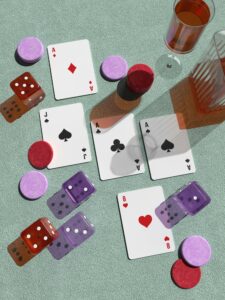The Journey to Becoming a Professional Poker Player: A Step-by-Step Guide


Becoming a professional poker player is an exciting and challenging pursuit that requires skills, patience, and a deep understanding of the game. If you are serious about turning poker into a career, it’s essential to know that it’s not just about playing the cards right; it’s about understanding strategy, mastering the psychological elements, and committing to continuous improvement. Here’s a step-by-step guide to help you on your journey to becoming a successful professional poker player.
Start with the Basics
Before diving into professional poker, you need to grasp the fundamentals. Understanding the rules of the game is essential. Whether you’re playing Texas Hold’em, Omaha, or any other variant, learning the basic mechanics—such as hand rankings, betting rounds, and strategies—should be your first step. You can start by watching tutorials, reading books, or joining beginner poker forums to understand how the game works clearly.
As you become comfortable with the rules, it’s essential to focus on learning basic strategies, managing your bankroll, knowing when to bet, and recognizing weak or strong hands. This learning phase may take time, and practicing on free poker platforms is recommended to sharpen your skills. The more you practice, the more confident you will become, making it easier to move on to higher-stakes games in the future.
Develop a Strong Mindset
Poker is as much about mental strength as it is about skill. Developing a strong mindset is crucial to handle the ups and downs of the game. There will be inevitable losing streaks, bad beats, and challenging situations that test your resilience. A professional player knows how to manage these emotions and avoid letting frustration or greed dictate decisions.
Maintaining focus and patience is key to long-term success in poker. Learn to accept losses and use them as learning experiences rather than obstacles. Every time you lose a hand, take a moment to reflect on what went wrong and how you can adjust your strategy moving forward. Building mental toughness will help you stay calm under pressure and make calculated decisions, which is a massive part of the professional poker player’s journey.
Master Poker Strategy
After learning the basics, the next step is to explore more advanced strategies. Professional poker players spend significant time analyzing their plays, understanding opponent tendencies, and adjusting their strategies based on the game type and situation. This requires a deep understanding of concepts like pot odds, implied odds, and positional awareness.
One effective way to improve your strategic thinking is to study hand histories and review your play. Consider using poker tracking software to analyze your results, identify leaks in your game, and fine-tune your strategy. Constantly evaluating your performance allows you to adjust and evolve as a player. By implementing a solid strategy adaptable to different situations, you can take your game to the next level and increase your chances of becoming a professional.
Play at Different Stakes
Once you have mastered the basic and advanced strategies, it’s time to move on to different stakes. Playing at higher stakes will expose you to more skilled players and force you to elevate your game. However, it’s important not to jump straight into high-stakes tournaments without first testing your skills at lower levels. This will allow you to build your bankroll and become accustomed to the pressures of more significant games.
Start by playing in micro or low-stakes games and gradually increase the stakes as you grow more confident. It’s important to always play within your bankroll limits to avoid going broke, especially as you transition into more competitive environments. The goal is to continuously challenge yourself while managing risk, ensuring you can keep learning while minimizing losses.
Join Poker Communities and Network
To become a successful professional poker player, connecting with others in the poker community is essential. Joining online poker forums, participating in discussions, and attending live poker events will help you learn from more experienced players. Networking can also open up opportunities for collaborations, partnerships, or coaching.
Moreover, professional poker players often exchange tips, strategies, and insights that you can learn from. By surrounding yourself with others who share the same passion for poker, you’ll gain valuable perspectives that can improve your game. Learning from others and building relationships in the poker community can provide you with the support and resources needed to continue advancing in your poker career.
Commit to Continuous Learning
Becoming a professional poker player is not a destination but an ongoing process. Even the best players continue to learn, adapt, and grow. The poker world constantly evolves with new strategies, trends, and technologies, and it’s essential to stay current to remain competitive.
Dedicate time to regularly reviewing your play, studying new techniques, and engaging with resources that can help you improve. Attend poker workshops, read the latest poker books, and watch videos from top players to continue learning. By committing to continuous improvement, you’ll maintain an edge over your opponents and ensure long-term success as a professional poker player.

